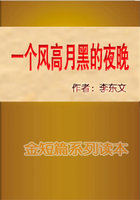The only thing to which I can venture to allude, out of all the books which he showed me, and these in French, too, is a passage which you will find in Father Bauny's Summary, p.165, relating to certain little familiarities, which, provided the intention is well directed, he explains "as passing for gallant"; and you will be surprised to find, on p.148 a principle of morals, as to the power which daughters have to dispose of their persons without the leave of their relatives, couched in these terms: "When that is done with the consent of the daughter, although the father may have reason to complain, it does not follow that she, or the person to whom she has sacrificed her honour, has done him any wrong, or violated the rules of justice in regard to him; for the daughter has possession of her honour, as well as of her body, and can do what she pleases with them, bating death or mutilation of her members." Judge, from that specimen, of the rest.It brings to my recollection a passage from a heathen poet, a much better casuist, it would appear, than these reverend doctors; for he says, "that the person of a daughter does not belong wholly to herself, but partly to her father and partly to her mother, without whom she cannot dispose of it, even in marriage." And I am much mistaken if there is a single judge in the land who would not lay down as law the very reverse of this maxim of Father Bauny.This is all I dare tell you of this part of our conversation, which lasted so long that I was obliged to beseech the monk to change the subject.He did so and proceeded to entertain me with their regulations about female attire."We shall not speak," he said, "of those who are actuated by impure intentions; but, as to others, Escobar remarks that 'if the woman adorn herself without any evil intention, but merely to gratify a natural inclination to vanity- ob naturalem fastus inclinationem- this is only a venial sin, or rather no sin at all.' And Father Bauny maintains, that 'even though the woman knows the bad effect which her care in adorning her person may have upon the virtue of those who may behold her, all decked out in rich and precious attire, she would not sin in so dressing.' And, among others, he cites our Father Sanchez as being of the same mind." "But, father, what do your authors say to those passages of Scripture which so strongly denounce everything of that sort?""Lessius has well met that objection," said the monk, "by observing, 'that these passages of Scripture have the force of precepts only in regard to the women of that period, who were expected to exhibit, by their modest demeanour, an example of edification to the Pagans.'" "And where did he find that, father"? "It does not matter where he found it," replied he;"it is enough to know that the sentiments of these great men are always probable of themselves.It deserves to be noticed, however, that Father Le Moine has qualified this general permission; for he will on no account allow it to be extended to the old ladies.'Youth,' he observes, 'is naturally entitled to adorn itself, nor can the use of ornament be condemned at an age which is the flower and verdure of life.But there it should be allowed to remain: it would be strangely out of season to seek for roses on the snow.The stars alone have a right to be always dancing, for they have the gift of perpetual youth.The wisest course in this matter, therefore, for old women, would be to consult good sense and a good mirror, to yield to decency and necessity, and to retire at the first approach of the shades of night.'" "A most judicious advice," I observed."But," continued the monk, "just to show you how careful our fathers are about everything you can think of, I may mention that, after granting the ladies permission to gamble, and foreseeing that, in many cases, this license would be of little avail unless they had something to gamble with, they have established another maxim in their favour, which will be found in Escobar's chapter on larceny, no.13: 'A wife,' says he, 'may gamble, and for this purpose may pilfer money from her husband.'" "Well, father, that is capital! "There are many other good things besides that," said the father; "but we must waive them and say a little about those more important maxims, which facilitate the practice of holy things- the manner of attending mass, for example.
On this subject, our great divines, Gaspard Hurtado and Coninck, have taught 'that it is quite sufficient to be present at mass in body, though we may be absent in spirit, provided we maintain an outwardly respectful deportment.'
Vasquez goes a step further, maintaining 'that one fulfils the precept of hearing mass, even though one should go with no such intention at all.'
All this is repeatedly laid down by Escobar, who, in one passage, illustrates the point by the example of those who are dragged to mass by force, and who put on a fixed resolution not to listen to it." "Truly, sir," said I, "had any other person told me that, I would not have believed it." "In good sooth," he replied, "it requires all the support which the authority of these great names can lend it; and so does the following maxim by the same Escobar, 'that even a wicked intention, such as that of ogling the women, joined to that of hearing mass rightly, does not hinder a man from fulfilling the service.' But another very convenient device, suggested by our learned brother Turrian, is that 'one may hear the half of a mass from one priest, and the other half from another; and that it makes no difference though he should hear first the conclusion of the one, and then the commencement of the other.' I might also mention that it has been decided by several of our doctors to be lawful 'to hear the two halves of a mass at the same time, from the lips of two different priests, one of whom is commencing the mass, while the other is at the elevation; it being quite possible to attend to both parties at once, and two halves of a mass making a whole- duae medietates unam missam constituunt.' 'From all which,' says Escobar, 'I conclude, that you may hear mass in a very short period of time; if, for example, you should happen to hear four masses going on at the same time, so arranged that when the first is at the commencement, the second is at the gospel, the third at the consecration, and the last at the communion.'" "Certainly, father, according to that plan, one may hear mass any day at Notre Dame in a twinkling." "Well," replied he, "that just shows how admirably we have succeeded in facilitating the hearing of mass.But I am anxious now to show you how we have softened the use of the sacraments, and particularly that of penance.It is here that the benignity of our fathers shines in its truest splendour; and you will be really astonished to find that devotion, a thing which the world is so much afraid of, should have been treated by our doctors with such consummate skill that, to use the words of Father Le Moine, in his Devotion Made Easy, demolishing the bugbear which the devil had placed at its threshold, they have rendered it easier than vice and more agreeable than pleasure; so that, in fact, simply to live is incomparably more irksome than to live well.Is that not a marvellous change, now?" "Indeed, father, I cannot help telling you a bit of my mind: I am sadly afraid that you have overshot the mark, and that this indulgence of yours will shock more people than it will attract.The mass, for example, is a thing so grand and so holy that, in the eyes of a great many, it would be enough to blast the credit of your doctors forever to show them how you have spoken of it." "With a certain class," replied the monk, "I allow that may be the case; but do you not know that we accommodate ourselves to all sorts of persons?
You seem to have lost all recollection of what I have repeatedly told you on this point.The first time you are at leisure, therefore, I propose that we make this the theme of our conversation, deferring till then the lenitives we have introduced into the confessional.I promise to make you understand it so well that you will never forget it." With these words we parted, so that our next conversation, I presume, will turn on the policy of the Society.I am, &c.P.S.Since writing the above, I have seen Paradise Opened by a Hundred Devotions Easily Practised, by Father Barry;and also the Mark of Predestination, by Father Binet; both of them pieces well worth the seeing.















